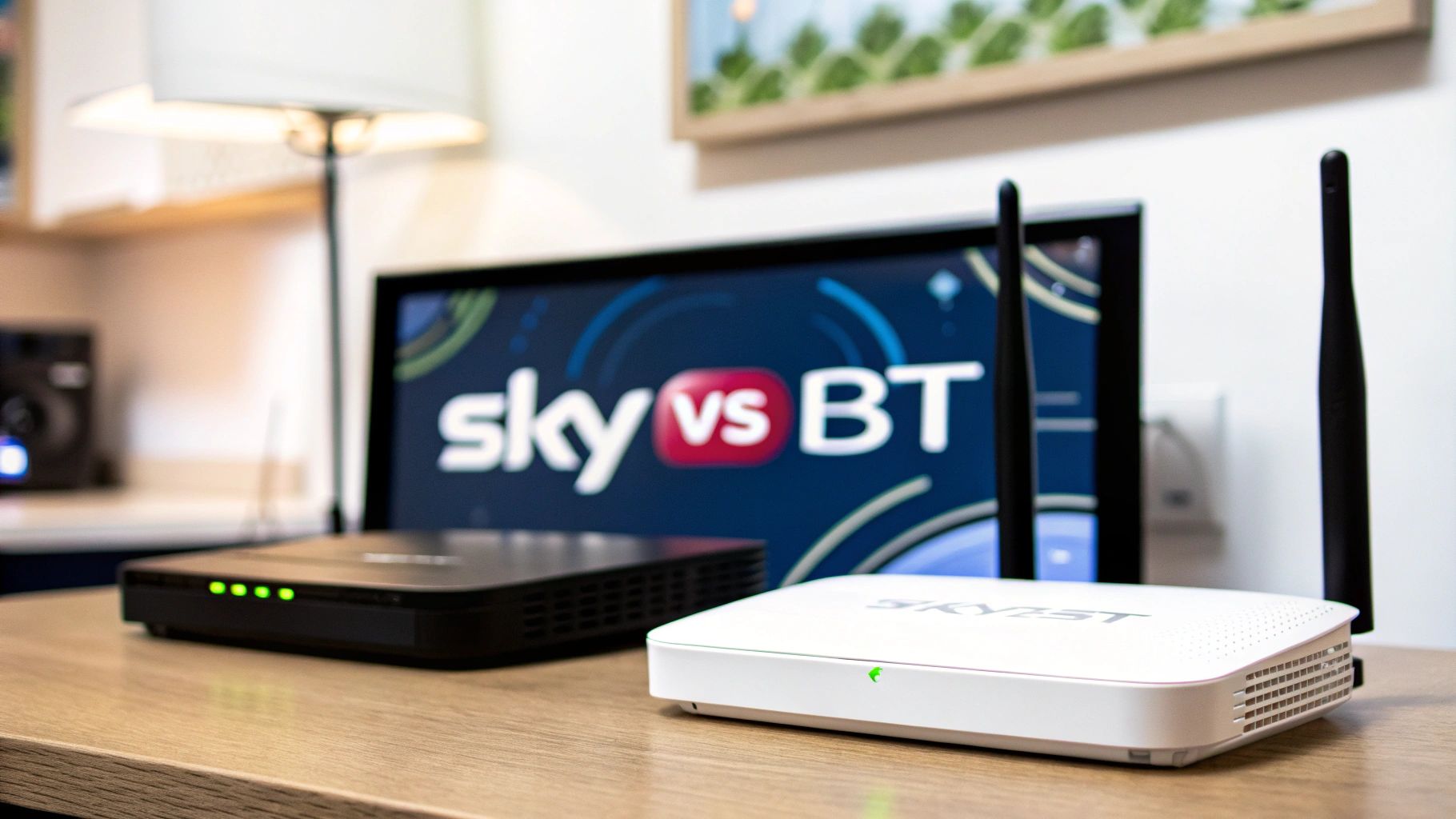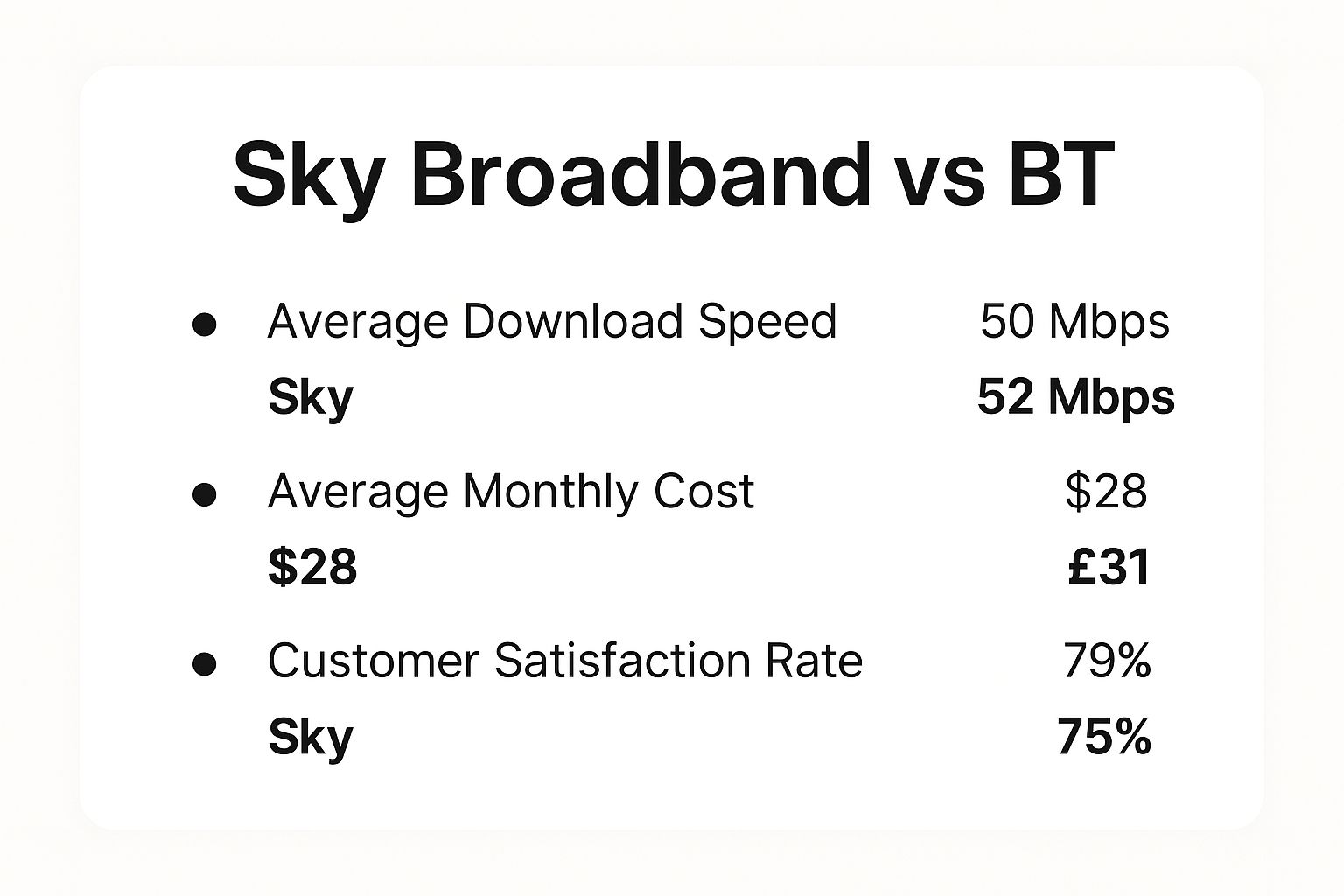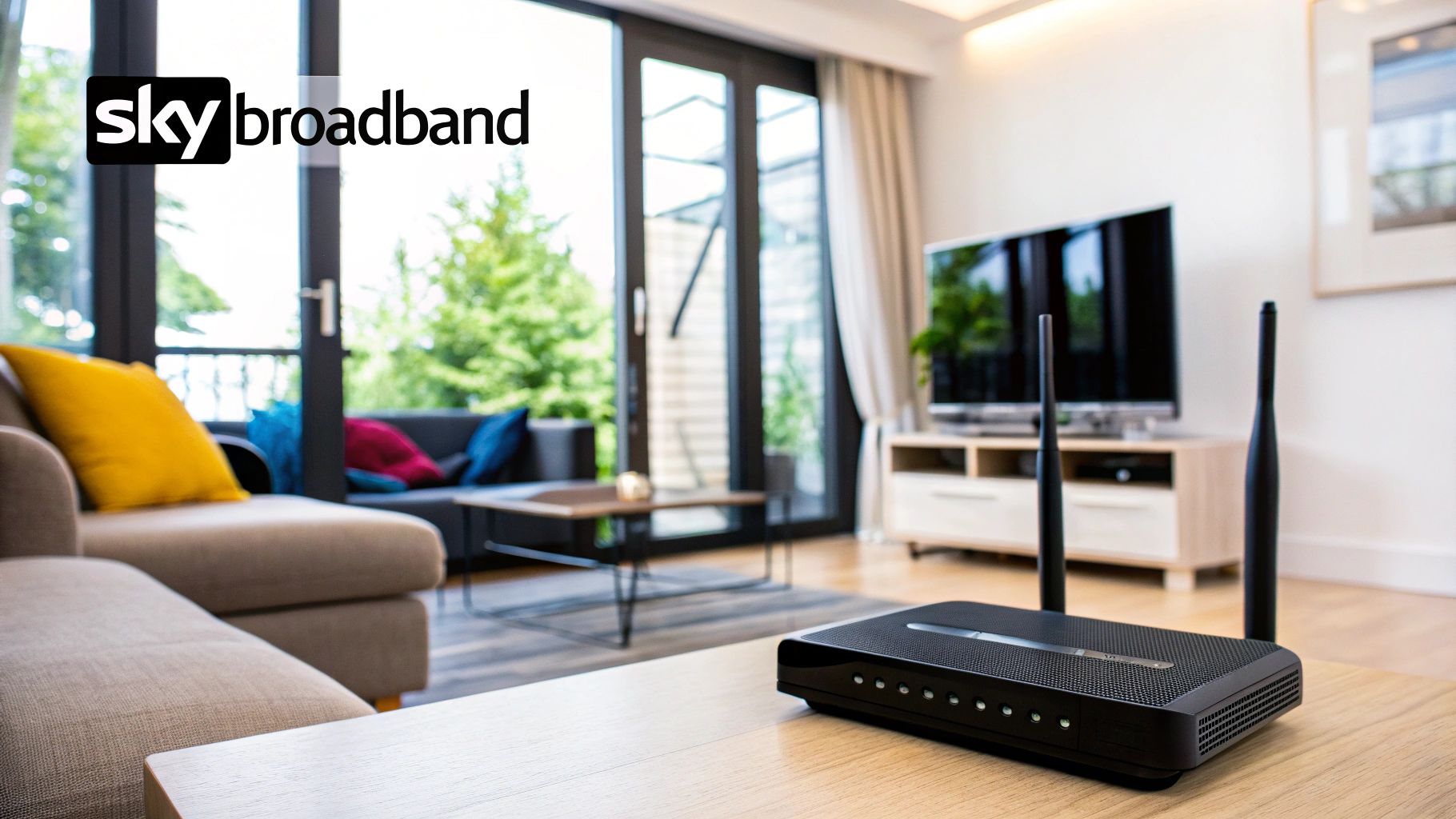Sky Broadband vs BT: A Clear Winner for Your Home
Sky Broadband vs BT: A Clear Winner for Your Home

At its core, the choice between Sky and BT boils down to a simple trade-off. Do you want unbeatable entertainment value, or are you chasing the best tech and the UK’s biggest network?
If you live for box sets and Premier League football, Sky’s bundled deals are hard to ignore. But if your priority is rock-solid reliability and a top-of-the-line router, BT often has the edge.
Ready to find the perfect deal for your home? You can check out the latest Sky Broadband deals or explore what BT Broadband packages have to offer. Using our links ensures you get access to the best available offers and helps support our work.
Sky vs BT: Which Provider Is Best for You?
Picking between these two broadband giants can feel like a tough call, but it gets much easier once you know what matters most to you. Both Sky and BT dominate the UK market for a reason—they offer a huge range of speeds, reliable connections, and some pretty compelling extras. The thing is, they’re built for slightly different households.
This guide is going to break down everything you need to know. We’ll get into the nitty-gritty of their real-world speeds, network coverage, customer support, and the all-important value of their bundles. By the end, you'll have a crystal-clear idea of which one is the right fit.
If you’re just starting your search, our general guide on how to choose an internet provider is a great place to get your bearings.
Quick Look: Sky vs BT At a Glance
Let's kick things off with a simple, high-level look at how Sky and BT compare. This table is your cheat sheet, giving you a quick snapshot of their core strengths and helping you spot the key differences right away.
This table gives you the essential rundown, but what do the numbers say?

As you can see, it's a seriously tight race. BT seems to have a slight advantage on raw speed, but Sky pulls ahead with a lower average monthly cost and slightly higher customer satisfaction scores. It really highlights that the "best" provider depends entirely on what you value most. The only way to know for sure is to see what deals are available for your home.
Comparing Network Infrastructure and Technology
To really understand the Sky Broadband vs BT debate, you have to look past the monthly bills and get down to the nuts and bolts of how they deliver their service. The network infrastructure a provider uses is the single biggest factor in how fast and reliable your connection will be. It's here that Sky and BT have taken completely different routes.

BT has a serious trump card up its sleeve: it owns and runs the Openreach network. This is the physical web of cables and cabinets that brings broadband to the overwhelming majority of UK homes. This gives BT direct, hands-on control over everything from routine maintenance and upgrades to the aggressive rollout of its full-fibre network.
When you sign up with BT, you’re basically plugging straight into the source. This direct line often means a smoother, faster support process if a fault pops up, and you’re usually first in the queue for the latest network tech. It's a key reason they’ve stayed at the top of the market for so long.
Ownership vs. Partnership
The UK broadband scene is fiercely competitive, but BT's ownership of Openreach gives it a massive head start. Sky Broadband and the BT Group are both giants, but BT is still the clear leader. As of early this year, BT Group has over 8.8 million broadband customers, putting it well ahead of Sky's nearly 5.8 million. That’s more than a third of the entire market, cementing BT's role as the UK's number one network provider. You can see the latest UK broadband market share stats over on Uswitch.com.
Sky, for its part, has always been a major customer of the Openreach network. But they're now making a very clever move to cut those ties by teaming up with CityFibre, the UK’s largest alternative full-fibre network builder.
This strategic pivot means Sky is actively building its own full-fibre future. If you live in a CityFibre area, you could get access to extremely competitive pricing and brand-new fibre technology that often matches or even beats what Openreach offers.
Choosing Sky could mean you’re getting in on the ground floor of a new, rapidly growing network. If you want to get into the nitty-gritty of the tech, have a look at our guide explaining the differences between fibre and cable internet.
What This Means for Your Connection
So, how does all this infrastructure talk actually affect the Wi-Fi in your home?
- For BT Customers: You’re getting the peace of mind that comes with a massive, mature network. It’s a direct line to the owner, which is perfect for anyone who values the sheer stability and nationwide availability that the UK's primary network operator provides.
- For Sky Customers: Your experience can vary depending on your postcode. For many, you’ll still get a fantastic service delivered over the Openreach network. But if you’re lucky enough to be in a CityFibre zone, you could get access to a cutting-edge, purpose-built fibre network, which is a seriously exciting alternative.
Ultimately, BT provides the reliability of the established network, while Sky offers a more dynamic, future-focused approach through its new partnership. The best way to guarantee you get the fastest, most stable connection is to check what's available for your specific address. Use our affiliate links to check the latest Sky Broadband plans and BT Broadband offers and secure the best deal for your home.
Real-World Speed and Full Fibre Performance
When it comes to the Sky Broadband vs BT showdown, speed is always a hot topic. But here’s the thing: the speeds you see advertised are often best-case scenarios. Your real, everyday performance is a different beast entirely, shaped by the technology powering your connection and how many gadgets are fighting for a slice of the bandwidth pie.
Both Sky and BT start with similar entry-level plans using Fibre-to-the-Cabinet (FTTC). This is where a speedy fibre optic cable runs to a cabinet on your street, but the last leg to your house uses an older copper phone line. With this setup, you can expect average speeds between 36Mbps and 67Mbps. It’s plenty for smaller households that mostly browse the web, stream in HD, and handle emails.
The real game-changer, though, is Full Fibre. This is where the magic happens. Officially known as Fibre-to-the-Premises (FTTP), it means a pure fibre optic cable runs straight into your home, unlocking seriously fast and rock-solid speeds.
Understanding Full Fibre Options
This is where both providers truly show what they're capable of, but they go about it slightly differently. BT owns the Openreach network, so its Full Fibre rollout is massive and constantly growing across the UK. Sky, on the other hand, delivers its fastest speeds using a mix of the Openreach network and, in certain areas, the alternative CityFibre network.
What does this mean for you? While they both offer similar top-end speeds, their availability can vary from one street to the next. The only way to know what you can get is to check. We recommend using our links to check for Sky’s Full Fibre deals here and find BT’s fastest packages here. By signing up through us, you help us keep bringing you great advice.
To give you a better feel for what these speeds mean in the real world:
- 100-150Mbps: This is a brilliant step up for busy families. It can easily juggle multiple 4K streams, intense online gaming, and a house full of smart devices all at once without breaking a sweat.
- 500Mbps: Now we're talking. This is the sweet spot for power users—think households with a couple of serious gamers, people working from home shifting huge files, and a whole army of connected tech running at the same time.
- 900+Mbps (Gigafast): This is the top-of-the-range, premium option. Frankly, it’s more speed than most of us need right now, but it completely future-proofs your home for whatever new tech is just around the corner.
The biggest win with Full Fibre isn't just the sheer download speed; it's the incredible reliability and low latency. Because fibre optic cables are tougher and less prone to interference than old copper wires, your connection is far more stable and responsive—a must-have for competitive online gaming and seamless video calls.
Which Speed Is Right for You?
Picking the right speed is all about finding that sweet spot between what you pay and what you actually use. There’s no point paying for a 900Mbps plan if you just scroll through social media. On the flip side, a family of four trying to game and stream 4K on a 36Mbps connection is a recipe for daily arguments.
It's a really important decision to get right. If you’re stuck, our detailed guide can help you figure out exactly how much broadband speed you really need based on your household's habits.
At the end of the day, when you compare Sky vs BT purely on speed, their performance is almost neck-and-neck at every level. Your final choice will likely come down to availability in your area, the price, and any TV or mobile extras you can bundle in. Click our links to check their latest offers and get the best value for your connection.
Analysing the Routers and In-Home Technology
Let's be honest, your broadband connection is only as good as the router pumping out Wi-Fi to your devices. When you're weighing up Sky broadband vs BT, the hardware you get in the box is a huge part of the deal. Both providers give you capable routers, but their features and optional upgrades are aimed at slightly different homes and needs.

As standard, most Sky customers will get the Sky Broadband Hub, while BT sends out its Smart Hub 2. Both are solid bits of kit. They support the Wi-Fi 5 standard, use intelligent channel switching to dodge interference from your neighbours' networks, and have enough oomph for the average UK home. If you’re just streaming HD TV and browsing, either router will do the job perfectly well.
Where you really see the difference is when you look at their premium hardware and whole-home Wi-Fi solutions. This is how you turn a good connection into a great one, guaranteeing you get the speeds you pay for in every single room.
Upgrading Your Wi-Fi for Complete Coverage
If you live in a larger house, have annoyingly thick walls, or just can't stand a dodgy connection, both providers have an upgrade path for you.
BT’s answer is its Complete Wi-Fi add-on. This brilliant system pairs the Smart Hub 2 with one or more Wi-Fi Discs. These discs create what’s known as a "mesh" network, spreading a strong, seamless signal all through your property. It’s a clever setup that ensures your phone or laptop automatically hops onto the strongest signal as you wander about.
Sky’s equivalent is its WiFi Max add-on. This gets you their more advanced Max Hub (which supports the newer Wi-Fi 6 standard) and Wi-Fi pods if your home needs them. This is Sky's take on a mesh system, designed to deliver reliable speeds to every nook and cranny.
Both BT's Complete Wi-Fi and Sky's WiFi Max come with a killer promise: a guaranteed minimum Wi-Fi speed in every room of your house. If they can't deliver it, you get money back. This makes them a fantastic investment for anyone fed up with Wi-Fi dead spots.
The Wi-Fi Guarantee Showdown
So, which guarantee comes out on top? BT’s Complete Wi-Fi promises a minimum of 10Mbps in every room, and if they fail, they'll give you £100 back. It’s a very clear and simple offer. Sky's WiFi Max guarantee is a bit more tailored to the speed package you're on but makes a similar promise of wall-to-wall coverage.
At the end of the day, BT’s system feels more established and its guarantee is incredibly straightforward. The combination of the Smart Hub 2 and the Wi-Fi Discs is a proven winner for wiping out weak signals. For homes where dependable coverage is the absolute top priority, BT has a very compelling argument.
Ready to banish Wi-Fi blackspots for good? You can check out BT’s Complete Wi-Fi packages or see the advanced router options available with Sky Broadband deals to find the perfect fit for your home. Signing up through these links is the best way to get started.
Customer Service and Network Reliability: What Happens When Things Go Wrong?
Let’s be honest, even the flashiest broadband deal is worthless if your connection drops during a crucial work meeting or right at the climax of a movie. When things go wrong, the quality of customer service you get suddenly becomes the most important thing. This is where we see some real differences between Sky and BT.
Both are giants with huge UK-based support teams, but the official numbers from Ofcom tell an interesting story. In the latest reports, Sky consistently gets fewer complaints per 100,000 customers than BT. That suggests that, day-to-day, you’re simply less likely to run into a problem that needs fixing if you’re with Sky.
That's not to say BT's support is bad—it isn't. They have a massive network of engineers and support staff who are good at solving problems. But when you look at call wait times and overall satisfaction, you start to see where one provider pulls ahead.
The Support Experience
Sky tends to get the nod from customers when it comes to how happy they are with the way complaints are handled. BT has been putting in a lot of effort to improve, but Sky’s customers consistently report slightly higher satisfaction levels overall.
While both companies will get your issue sorted most of the time, Ofcom’s data shows Sky has a small but noticeable edge in overall customer satisfaction. If you can't stand the thought of being stuck on hold or having to chase up a support ticket, that small difference could be a big deal.
Network Reliability and Outages
Of course, a provider that rarely goes down means you won’t be making those calls in the first place. Here, things get a bit closer, because both Sky and BT use the incredibly resilient Openreach network for most of their connections. This means their underlying reliability is very similar.
The difference lies in how they manage things behind the scenes and communicate with you when there’s an outage.
- BT’s Advantage: As the owner of the Openreach network, BT has a direct line of sight into network problems. This can sometimes mean they diagnose faults quicker and provide clearer updates.
- Sky’s Strength: Sky’s proven track record in customer service often means they’re better at managing your expectations and providing helpful support when the network does have a wobble.
Ultimately, both networks are exceptionally stable, and major outages are rare for either. The choice really boils down to who you trust more to have your back when an issue does pop up.
If you’d feel more comfortable with a provider known for keeping customers happy and generating fewer complaints, it’s a great time to explore Sky’s latest offers. If you prefer the idea of being with the company that owns the network infrastructure, you can check out BT’s packages here.
Uncovering the Best Value with Bundles and Perks
When you’re weighing up Sky broadband vs BT, the monthly price is only half the story. The real value often shines through when you look at the complete package – what you get when you combine your internet with TV, mobile, and other extras. This is where both providers really play to their strengths, offering bundles that are clearly built for different kinds of households.

For a lot of people, the decision is pretty straightforward. If your home life revolves around entertainment – from the latest blockbuster movies to exclusive dramas and Premier League football – then Sky is incredibly tough to beat. Their ability to seamlessly bundle Sky TV with their broadband is their killer feature, and it can often save you a good chunk of money compared to getting the services separately.
On the other hand, BT has a strong pitch for sports fanatics and anyone looking to save on their mobile bill. As the home of TNT Sports, it's the only place you can watch certain live events like the Champions League. On top of that, bundling BT broadband frequently unlocks exclusive discounts on EE mobile plans, which is a huge advantage now the two companies are so closely linked.
Maximising Savings with the Right Bundle
Figuring out who offers the better deal comes down to what you and your family actually use. It’s all about matching the bundle to your lifestyle, not just chasing the cheapest headline price.
Here’s a quick breakdown of how the value stacks up for different people:
- For the Movie and TV Buff: It has to be Sky. Bundling Sky Stream or Sky Glass with your broadband gives you an unbeatable entertainment setup. All your subscriptions and channels are in one place, on one simple bill.
- For the Die-Hard Sports Fan: This one’s a bit trickier. Sky has the rights to F1 and key Premier League games, but BT is the only way to get TNT Sports. Your choice really boils down to which team or sport you simply can't miss.
- For the Budget-Conscious Family: You need to look at the total household spend. If you're already with EE for your mobiles, the discounts you'll get by adding BT broadband could easily make their bundle the most cost-effective choice overall.
Choosing the right bundle is where you can make the most significant savings. We strongly recommend using our links to build a custom package and see the final monthly cost for yourself. You can build your perfect Sky entertainment bundle here or check BT’s latest broadband and mobile deals here.
There’s a big change happening in the background that affects all of this, too. Historically, Sky’s broadband has piggybacked almost entirely on BT’s Openreach network. But that’s changing. Sky is now moving customers onto CityFibre’s independent full fibre network, which already serves over 518,000 customers and is available to 4.3 million homes. This is a massive shift that introduces more competition at the infrastructure level, which you can read more about on Data Centre Dynamics. It could lead to even better deals down the line.
Ultimately, Sky’s bundles are built around its world-class TV content, while BT’s value is anchored by its exclusive sports rights and its powerful integration with EE mobile. Pick the package that aligns with what you already use and love, and you’re guaranteed to get the best value for your money.
Common Questions About Sky and BT Broadband
Even after comparing all the details, you might still have a few lingering questions. It’s completely normal. Let's tackle some of the most common queries we see to help you lock in your decision.
Is Sky or BT Better for Gaming?
For any serious gamer, this is a huge one. Both Sky and BT have the top-tier, full-fibre plans you need to keep lag and latency at bay. That said, if we have to pick a winner, BT usually takes a slight lead.
Why? Their Smart Hub routers are some of the best in the business, and their network consistently delivers incredibly low jitter, which is crucial for competitive online gaming. If getting every possible edge in Call of Duty or Valorant is your main goal, BT's premium packages are hard to beat.
Pro Tip: Before you commit, we highly recommend you check which provider offers full-fibre in your postcode. Click through to see what speeds are available and check the latest BT deals for gaming on their site.
Can I Get Sky TV with BT Broadband?
Yes, you absolutely can. This is a common setup for people who want the best of both worlds. Sky now offers its TV service as a standalone product through Sky Stream or Sky Glass, which work over any provider's internet connection.
This gives you the freedom to pair BT's reliable broadband with Sky's unbeatable TV line-up. Just bear in mind that bundling your TV and broadband directly with Sky is almost always cheaper and means you only have one bill to worry about. Signing up for a bundle is the best way to save.
Which Provider Is Easier to Switch To?
Good news on this front. Since Sky and BT both operate on the Openreach network, switching between them is a walk in the park.
Your new provider handles all the admin, including telling your old one you're leaving. For most people, it's a completely seamless transition. The only time you'll likely need an engineer to visit is if you're upgrading to a full-fibre connection for the very first time. You can start this simple process by clicking one of our links today.
Who Offers Better TV and Sports Packages?
This one comes down to personal taste and what you can't live without.
Sky is still the undisputed champion for premium entertainment, with a massive library of movies and exclusive sports like Formula 1. On the other hand, BT is the exclusive home of TNT Sports, which is non-negotiable for fans of the Champions League and Premiership Rugby.
Your best bet is to figure out which channels are your "must-haves" and go from there. Bundling is where you'll find the biggest savings, so it’s always worth using our affiliate links to check the latest packages directly on their websites and lock in the best price.
Feeling ready to make a choice? The team at Humble Reviewer has put in the hours to help you find the best possible deal. Use our links to check the latest offers and sign up. Explore your options at https://www.humblereviewer.com.
